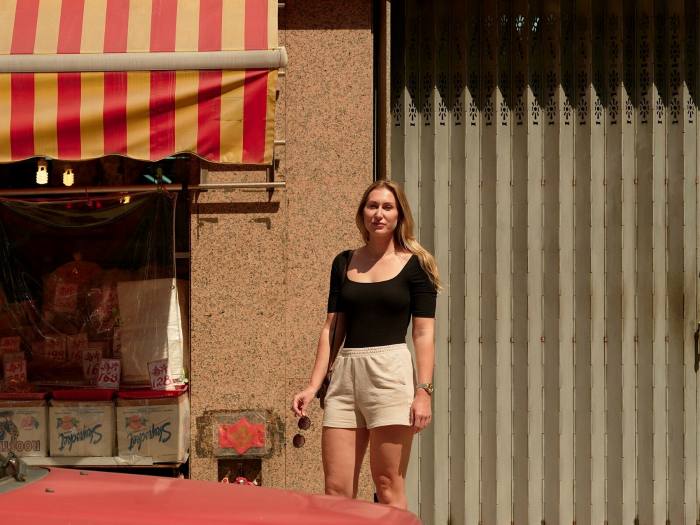Hong Kong’s expat party continues — but for how long?
Like anyone else brave or stupid enough to move to Hong Kong at the peak of the Covid-19 pandemic, I spent three long weeks in a hotel room in the city before once standing in its streets.
When I was freed, the day after Boxing Day 2020, following three PCR tests that each threatened to detain me for far longer, I wandered in a daze to the Peak Tram, which would take me to the highest point of Hong Kong island, the funicular’s hard wooden seats reclining on the steep climb.
At the top of the Peak, the wind whipped my hair, the closeness of the air at sea level had evaporated, and I relished every cool, fragrant gust, looking down for the first time at the forest of skyscrapers and the hazy blue harbour I had seen only a slither of through a locked window for the past 21 days.
Life for an expat in Hong Kong during Covid has been one of dizzying contradictions: where closed borders and the threat of state quarantine centres loom over daily life, but where each weekend is a blur of boat parties (“junks”), breathtakingly scenic hikes, secluded beaches and champagne on rooftops at sunset.
One where political headwinds seem to be growing slowly in a different part of town until they slap you in the face. Where one case of Covid in your gym could mean you and everyone you know are dragged to quarantine for weeks. Where horror stories about friends of friends separated from their children or trapped in the infamous Penny’s Bay Covid facility are traded over dinner or cocktails four nights a week with the friends you see more than your family.
If this sounds tone deaf in a city going through a transformational period, where Chinese anti-protest laws have stifled citizens’ human rights and the authors of “seditious” children’s books and peaceful protesters are sent to jail, then that’s because it is. Life as a western expat in Hong Kong has so far been entirely cocooned from the political turmoil.
Being an expat — or gweilo — in Hong Kong is an identity complicated by the city’s twinned Chinese and western cultures and separate from immigrant status because even after decades of living here lots of people feel it is temporary. Quarantine experiences pepper every conversation, but political oppression never does. The privilege of being able to leave is worn casually.
Now, 25 years after Hong Kong was returned to China, the revelrous energy that Kipling described still runs through Hong Kong’s venous streets. It is teeming with Life. An unfathomable number of things and people populate the high-rises that tower over every street. Unsettling FOMO creeps in.
At ground level, there is a perpetual sense of motion. In Sheung Wan, where the FT occupies the sixth floor of one indistinguishable tower, cardboard clutters the roads because the unloading of goods never stops. Every inch of space is used. The density of towers, each with thousands of homes and businesses, is startling. The best way to escape the sensory overload is to descend through a camouflaged door to a cool, windowless speakeasy or gin parlour.
Far from lamenting the slow erosion of Hong Kong as an expat playground, the American chairman of a bank who has been here for more than 30 years once remarked to me that one day we’ll look back and wonder how it lasted as long as it did.
As Hong Kong is brought into closer alignment with Beijing policies, it is likely to more closely resemble life in Shenzhen than London or New York. That it is becoming “just another Chinese city” is a common complaint.

As expats leave the city, mainland Chinese workers arrive. International businesses are replacing their depleted expat ranks with more local talent. Hong Kong has always been caught in a cultural custody battle between China and the west but, with Xi Jinping’s brand of nationalism and disregard for the “one country, two systems” arrangement created by Deng Xiaoping, it’s unsurprising that it is becoming more Chinese.
The end of the summer is now approaching in Hong Kong and the months of heavy, wet heat are starting to dissolve. Sitting outdoors is possible once again; the hiking trails are getting busier. The city is abuzz with gossip about what the effects will be of the decision to scrap quarantine before a banking conference and the rugby sevens in November.
But there is cause for gloom. China has launched a new round of punishing lockdowns across the border before the Communist party congress in October. Dozens of pro-democracy politicians and activists are awaiting non-jury trials in Hong Kong for alleged national security offences, possibly by the end of the year. The 74-year-old Apple Daily owner Jimmy Lai faces prison over accusations of publishing “seditious” content, in a trial that will be a landmark moment for independent journalism in a Chinese territory.
But for most people, daily life is edging gradually towards a semblance of normality. For now, it is autumn in Hong Kong.
Tabby Kinder is the FT’s West Coast finance editor based in San Francisco, previously Asia financial correspondent in Hong Kong
Find out about our latest stories first — follow @FTProperty on Twitter or @ft_houseandhome on Instagram
This story originally appeared on: Financial Times - Author:Tabby Kinder
























